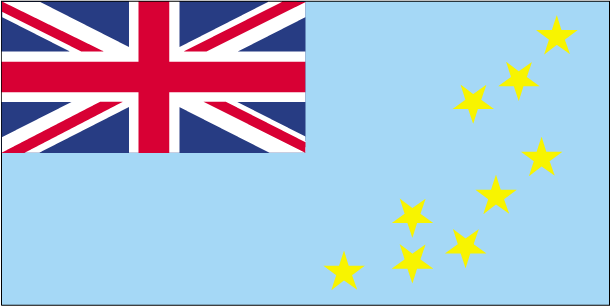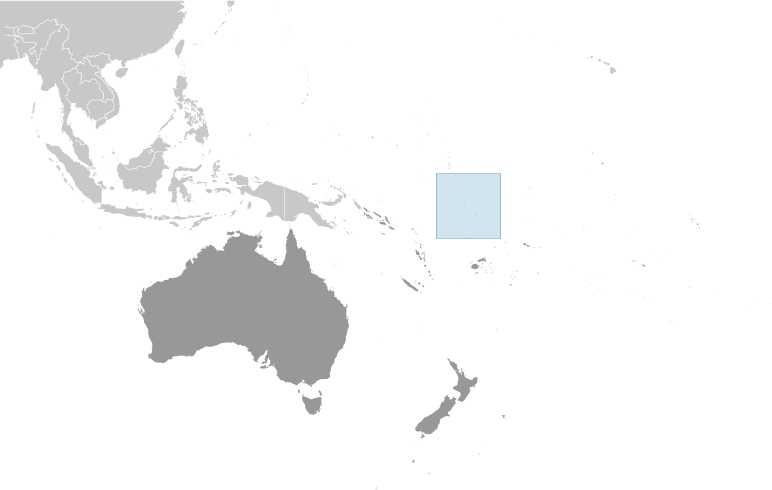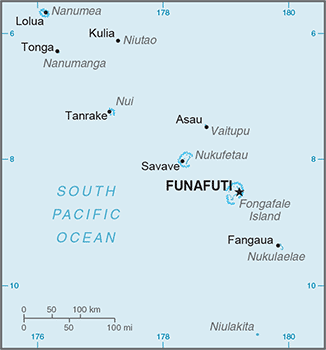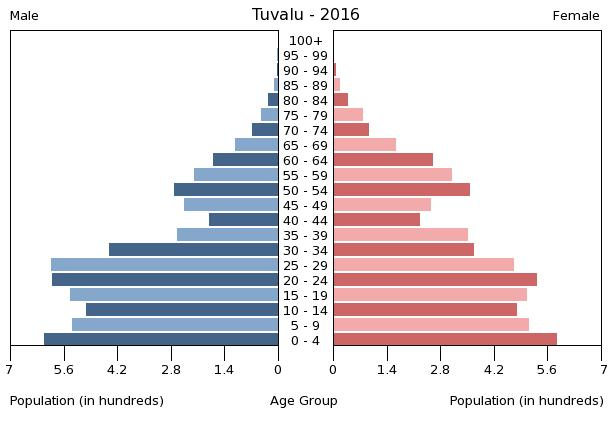Introduction :: TUVALU
-
In 1974, ethnic differences within the British colony of the Gilbert and Ellice Islands caused the Polynesians of the Ellice Islands to vote for separation from the Micronesians of the Gilbert Islands. The following year, the Ellice Islands became the separate British colony of Tuvalu. Independence was granted in 1978. In 2000, Tuvalu negotiated a contract leasing its Internet domain name ".tv" for $50 million in royalties over a 12-year period. The agreement was subsequently renegotiated but details were not disclosed.
Geography :: TUVALU
-
Oceania, island group consisting of nine coral atolls in the South Pacific Ocean, about half way from Hawaii to Australia
8 00 S, 178 00 E
Oceania
total: 26 sq km
land: 26 sq km
water: 0 sq km
country comparison to the world: 239
0.1 times the size of Washington, DC
0 km
24 km
territorial sea: 12 nm
contiguous zone: 24 nm
exclusive economic zone: 200 nm
tropical; moderated by easterly trade winds (March to November); westerly gales and heavy rain (November to March)
low-lying and narrow coral atolls
mean elevation: 2 m
elevation extremes: lowest point: Pacific Ocean 0 m
highest point: unnamed location 5 m
fish, coconut (copra)
agricultural land: 60%
arable land 0%; permanent crops 60%; permanent pasture 0%
forest: 33.3%
other: 6.7% (2011 est.)
0 sq km (2012)
over half of the population resides on the atoll of Funafuti
severe tropical storms are usually rare, but in 1997 there were three cyclones; low levels of islands make them sensitive to changes in sea level
water needs met by catchment systems; the use of sand as a building material has led to beachhead erosion; excessive clearance of forest undergrowth for use as fuel; damage to coral reefs from increasing ocean temperatures and acidification; rising sea levels threaten water table; in 2000, the government appealed to Australia and New Zealand to take in Tuvaluans if rising sea levels should make evacuation necessary
party to: Biodiversity, Climate Change, Climate Change-Kyoto Protocol, Desertification, Law of the Sea, Ozone Layer Protection, Ship Pollution, Whaling
signed, but not ratified: none of the selected agreements
one of the smallest and most remote countries on Earth; six of the nine coral atolls - Nanumea, Nui, Vaitupu, Nukufetau, Funafuti, and Nukulaelae - have lagoons open to the ocean; Nanumaya and Niutao have landlocked lagoons; Niulakita does not have a lagoon
People and Society :: TUVALU
-
11,052 (July 2017 est.)
country comparison to the world: 222
noun: Tuvaluan(s)
adjective: Tuvaluan
Polynesian 96%, Micronesian 4%
Tuvaluan (official), English (official), Samoan, Kiribati (on the island of Nui)
Protestant 98.4% (Church of Tuvalu (Congregationalist) 97%, Seventh-Day Adventist 1.4%), Baha'i 1%, other 0.6%
0-14 years: 29.29% (male 1,659/female 1,578)
15-24 years: 19.26% (male 1,106/female 1,023)
25-54 years: 36.66% (male 2,036/female 2,016)
55-64 years: 8.77% (male 396/female 573)
65 years and over: 6.02% (male 263/female 402) (2017 est.)
population pyramid:

Australia-Oceania
::TUVALU

Population Pyramid
A population pyramid illustrates the age and sex structure of a country's population and may provide insights about political and social stability, as well as economic development. The population is distributed along the horizontal axis, with males shown on the left and females on the right. The male and female populations are broken down into 5-year age groups represented as horizontal bars along the vertical axis, with the youngest age groups at the bottom and the oldest at the top. The shape of the population pyramid gradually evolves over time based on fertility, mortality, and international migration trends.
For additional information, please see the entry for Population pyramid on the Definitions and Notes page under the References tab.
total: 25.7 years
male: 24.7 years
female: 26.9 years (2017 est.)
country comparison to the world: 152
0.85% (2017 est.)
country comparison to the world: 128
23.7 births/1,000 population (2017 est.)
country comparison to the world: 62
8.5 deaths/1,000 population (2017 est.)
country comparison to the world: 79
-6.7 migrant(s)/1,000 population (2017 est.)
country comparison to the world: 203
over half of the population resides on the atoll of Funafuti
urban population: 61.5% of total population (2017)
rate of urbanization: 1.71% annual rate of change (2015-20 est.)
FUNAFUTI (capital) 6,000 (2014)
at birth: 1.05 male(s)/female
0-14 years: 1.05 male(s)/female
15-24 years: 1.1 male(s)/female
25-54 years: 0.99 male(s)/female
55-64 years: 0.69 male(s)/female
65 years and over: 0.69 male(s)/female
total population: 0.98 male(s)/female (2016 est.)
23.5 years
note: median age at first birth among women 25-29 (2007 est.)
total: 29 deaths/1,000 live births
male: 31.5 deaths/1,000 live births
female: 26.4 deaths/1,000 live births (2017 est.)
country comparison to the world: 66
total population: 66.9 years
male: 64.7 years
female: 69.2 years (2017 est.)
country comparison to the world: 173
2.95 children born/woman (2017 est.)
country comparison to the world: 58
30.5% (2007)
16.5% of GDP (2014)
country comparison to the world: 3
1.22 physicians/1,000 population (2009)
improved:
urban: 98.3% of population
rural: 97% of population
total: 97.7% of population
unimproved:
urban: 1.7% of population
rural: 3% of population
total: 2.3% of population (2015 est.)
improved:
urban: 86.3% of population
rural: 80.2% of population
total: 83.3% of population
unimproved:
urban: 13.7% of population
rural: 19.8% of population
total: 16.7% of population (2012 est.)
NA
NA
NA
51.6% (2016)
country comparison to the world: 5
1.6% (2007)
country comparison to the world: 126
NA
Government :: TUVALU
-
conventional long form: none
conventional short form: Tuvalu
local long form: none
local short form: Tuvalu
former: Ellice Islands
etymology: "tuvalu" means "group of eight" or "eight standing together" referring to the country's eight traditionally inhabited islands
parliamentary democracy (House of Assembly) under a constitutional monarchy; a Commonwealth realm
name: Funafuti; note - the capital is an atoll of some 29 islets; administrative offices are in Vaiaku Village on Fongafale Islet
geographic coordinates: 8 31 S, 179 13 E
time difference: UTC+12 (17 hours ahead of Washington, DC, during Standard Time)
7 island councils and 1 town council*; Funafuti*, Nanumaga, Nanumea, Niutao, Nui, Nukufetau, Nukulaelae, Vaitupu
1 October 1978 (from the UK)
Independence Day, 1 October (1978)
previous 1978 (at independence); latest effective 1 October 1986; amended 2007, 2010, 2013 (2016)
mixed legal system of English common law and local customary law
has not submitted an ICJ jurisdiction declaration; non-party state to the ICCt
citizenship by birth: yes
citizenship by descent: yes; for a child born abroad, at least one parent must be a citizen of Tuvalu
dual citizenship recognized: yes
residency requirement for naturalization: na
18 years of age; universal
chief of state: Queen ELIZABETH II (since 6 February 1952); represented by Governor General Iakoba TAEIA Italeli (since 16 April 2010)
head of government: Prime Minister Enele SOPOAGA (since 5 August 2013)
cabinet: Cabinet appointed by the governor general on recommendation of the prime minister
elections/appointments: the monarchy is hereditary; governor general appointed by the monarch on recommendation of the prime minister; prime minister and deputy prime minister elected by and from members of House of Assembly following parliamentary elections
election results: Enele SOPOAGA elected prime minister by House of Assembly; House of Assembly vote count on 4 August 2013 - 8 to 5; note - Willie TELAVI removed as prime minister by the governor general on 1 August 2013
description: unicameral House of Assembly or Fale I Fono (15 seats; members directly elected in single- and multi-seat constituencies by simple majority vote to serve 4-year terms)
elections: last held on 31 March 2015 (next to be held in 2019)
election results: percent of vote - NA; seats - independent 15; 12 members reelected
highest court(s): Court of Appeal (consists of the chief justice and not less than 3 appeals judges); High Court (consists of the chief justice); appeals beyond the Court of Appeal are heard by the Judicial Committee of the Privy Council (in London)
judge selection and term of office: Appeal Court judges appointed by the governor general on the advice of the Cabinet; judges' tenure based on terms of appointment; High Court chief justice appointed by the governor general on the advice of the Cabinet; chief justice appointed for life; other judges appointed by the governor-general on the advice of the Cabinet after consultation with chief justice; tenure of judges set by terms of appointment
subordinate courts: magistrates' courts; island courts; land courts
there are no political parties but members of parliament usually align themselves in informal groupings
none
ACP, ADB, AOSIS, C, FAO, IBRD, IDA, IFAD, IFRCS (observer), ILO, IMF, IMO, IOC, ITU, OPCW, PIF, Sparteca, SPC, UN, UNCTAD, UNESCO, UNIDO, UPU, WHO, WIPO, WMO
chief of mission: Ambassador Samuelu LALONIU (since 21 July 2017)
chancery: note - Tuvalu does not have an embassy in Washington, D.C.; UN office located at 800 2nd Avenue, Suite 400D, New York, NY 10017
telephone: [1] (212) 490-0534
FAX: [1] (212) 937-0692
the US does not have an embassy in Tuvalu; the US Ambassador to Fiji is accredited to Tuvalu
light blue with the flag of the UK in the upper hoist-side quadrant; the outer half of the flag represents a map of the country with nine yellow, five-pointed stars on a blue field symbolizing the nine atolls in the ocean
maneapa (native meeting house); national colors: light blue, yellow
name: "Tuvalu mo te Atua" (Tuvalu for the Almighty)
lyrics/music: Afaese MANOA
note: adopted 1978; the anthem's name is also the nation's motto
Economy :: TUVALU
-
Tuvalu consists of a densely populated, scattered group of nine coral atolls with poor soil. Only eight of the atolls are inhabited. It is one of the smallest countries in the world, with its highest point at 4.6 meters above sea level. The country is isolated, almost entirely dependent on imports, particularly of food and fuel, and vulnerable to climate change and rising sea levels, which pose significant challenges to development.
The public sector dominates economic activity. Tuvalu has few natural resources, except for its fisheries. Earnings from fish exports and fishing licenses for Tuvalu’s territorial waters are a significant source of government revenue. In 2013, revenue from fishing licenses doubled and totaled more than 45% of GDP.
Official aid from foreign development partners has also increased. Tuvalu has substantial assets abroad. The Tuvalu Trust Fund, an international trust fund established in 1987 by development partners, has grown to $104 million (A$141 million) in 2014 and is an important cushion for meeting shortfalls in the government's budget. While remittances are another substantial source of income, the value of remittances has declined since the 2008-09 global financial crisis, but has stabilized at nearly $4 million per year. The financial impact of climate change and the cost of climate related adaptation projects is one of many concerns for the nation.
$40 million (2016 est.)
$38 million (2015 est.)
$34 million (2014 est.)
note: data are in 2016 dollars
country comparison to the world: 226
$37 million (2016 est.)
3% (2016 est.)
9.1% (2015 est.)
1.3% (2014 est.)
country comparison to the world: 59
$3,600 (2016 est.)
$3,500 (2015 est.)
$3,200 (2014 est.)
note: data are in 2016 dollars
country comparison to the world: 185
agriculture: 24.5%
industry: 5.6%
services: 70% (2012 est.)
coconuts; fish
fishing
-26.1% (2012 est.)
country comparison to the world: 201
3,615 (2004 est.)
country comparison to the world: 224
note: people make a living mainly through exploitation of the sea, reefs, and atolls and through overseas remittances (mostly from workers in the phosphate industry and sailors)
NA%
26.3% (2010 est.)
lowest 10%: NA%
highest 10%: NA%
revenues: $42.68 million
expenditures: $32.46 million (2012 est.)
125.5% of GDP (2013 est.)
country comparison to the world: 1
30.1% of GDP (2013 est.)
country comparison to the world: 1
53.7% of GDP (2016 est.)
58.2% of GDP (2015 est.)
country comparison to the world: 90
calendar year
3.5% (2016 est.)
3.2% (2015 est.)
country comparison to the world: 149
10.6% (31 December 2013 est.)
10.6% (31 December 2012 est.)
country comparison to the world: 74
$0 (2014)
country comparison to the world: 123
$-12 million (2016 est.)
$2 million (2015 est.)
country comparison to the world: 59
$600,000 (2010 est.)
$1 million (2004 est.)
country comparison to the world: 221
copra, fish
Bosnia and Herzegovina 24.8%, Singapore 18.8%, Nigeria 17.3%, Fiji 14.5%, US 6% (2016)
$136.5 million (2013 est.)
$238.6 million (2012 est.)
country comparison to the world: 212
food, animals, mineral fuels, machinery, manufactured goods
Singapore 51.3%, NZ 9.4%, Australia 8.6%, US 6.8%, Japan 6.1%, Fiji 5.9% (2016)
$NA
Tuvaluan dollars or Australian dollars (AUD) per US dollar -
1.3442 (2013)
1.67 (2014 est.)
1.352 (2013 est.)
0.97 (2012 est.)
Energy :: TUVALU
-
population without electricity: 6,137
electrification - total population: 45%
electrification - urban areas: 57%
electrification - rural areas: 32% (2012)
11.8 million kWh (2011)
country comparison to the world: 215
0 kWh (2014 est.)
country comparison to the world: 207
0 kWh (2014)
country comparison to the world: 211
5,100 kW (2011)
country comparison to the world: 212
96% of total installed capacity (2015 est.)
country comparison to the world: 51
0% of total installed capacity (2014)
country comparison to the world: 196
0% of total installed capacity (2014)
country comparison to the world: 209
0 bbl/day (2014)
country comparison to the world: 203
0 bbl/day (2014)
country comparison to the world: 201
0 bbl/day (2014)
country comparison to the world: 200
0 bbl (2014 est.)
country comparison to the world: 204
0 bbl/day (2014 est.)
country comparison to the world: 205
0 bbl/day
country comparison to the world: 206
0 cu m (2014)
country comparison to the world: 204
0 cu m (2014)
country comparison to the world: 140
0 cu m (2014)
country comparison to the world: 197
0 cu m (2014)
country comparison to the world: 198
Communications :: TUVALU
-
total subscriptions: 2,000
subscriptions per 100 inhabitants: 18 (July 2016 est.)
country comparison to the world: 215
total: 7,600
subscriptions per 100 inhabitants: 69 (July 2016 est.)
country comparison to the world: 217
general assessment: serves particular needs for internal communications
domestic: radiotelephone communications between islands
international: country code - 688; international calls can be made by satellite (2015)
no TV stations; many households use satellite dishes to watch foreign TV stations; 1 government-owned radio station, Radio Tuvalu, includes relays of programming from international broadcasters (2009)
.tv
total: 5,042
percent of population: 46.0% (July 2016 est.)
country comparison to the world: 206
Transportation :: TUVALU
-
T2 (2016)
1 (2013)
country comparison to the world: 235
total: 1
1,524 to 2,437 m: 1 (2013)
total: 8 km
paved: 8 km (2011)
country comparison to the world: 223
total: 58
by type: bulk carrier 4, cargo 24, chemical tanker 15, container 1, passenger 2, passenger/cargo 1, petroleum tanker 10, refrigerated cargo 1
foreign-owned: 33 (China 4, Indonesia 1, Maldives 1, Singapore 19, South Korea 1, Turkey 1, Vietnam 6) (2010)
country comparison to the world: 68
major seaport(s): Funafuti
Military and Security :: TUVALU
-
no regular military forces; Tuvalu Police Force (2012)
Transnational Issues :: TUVALU
-
none












